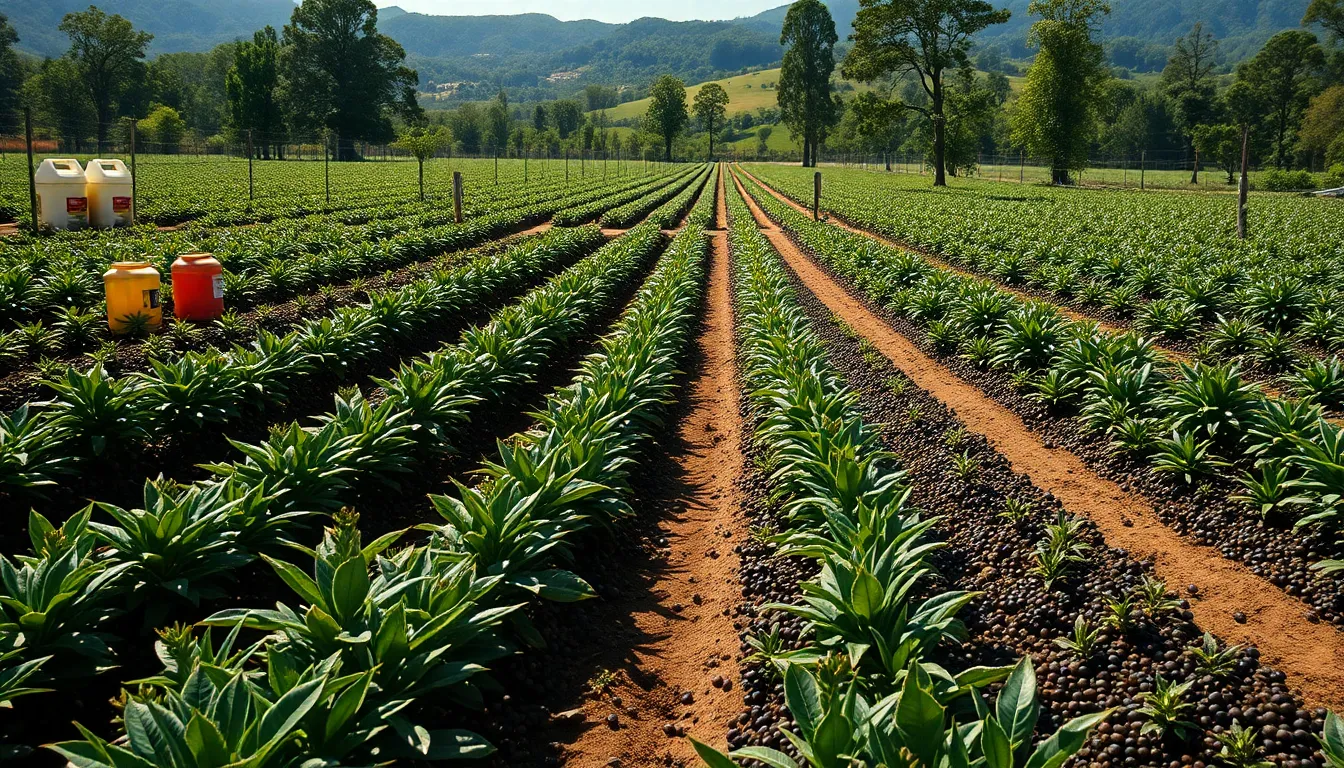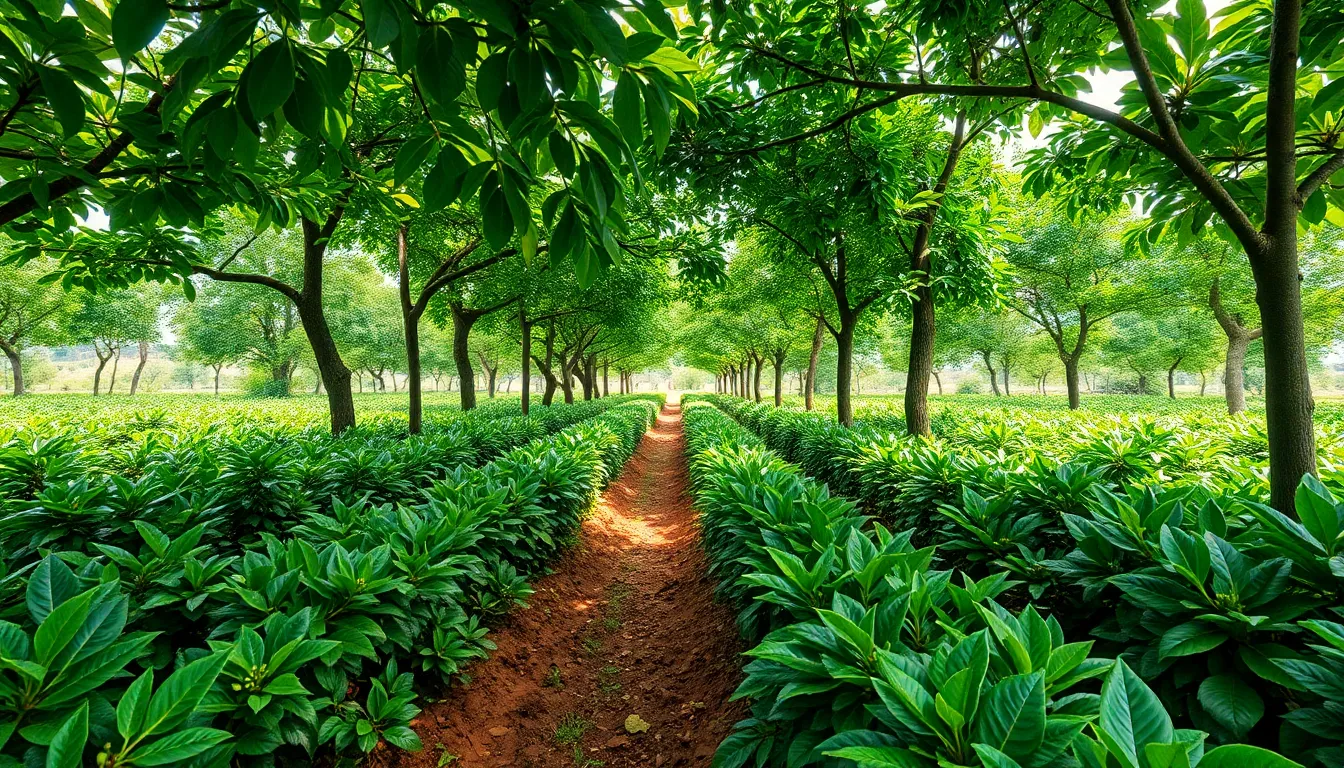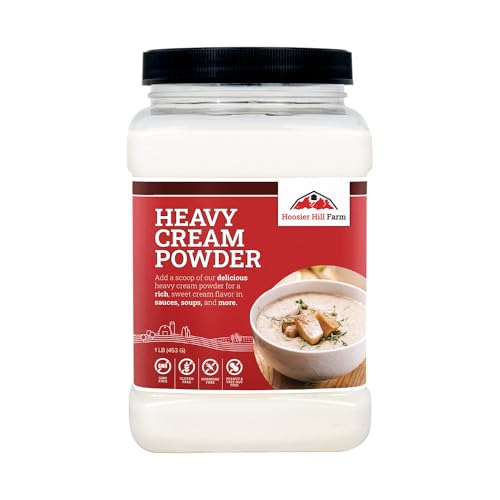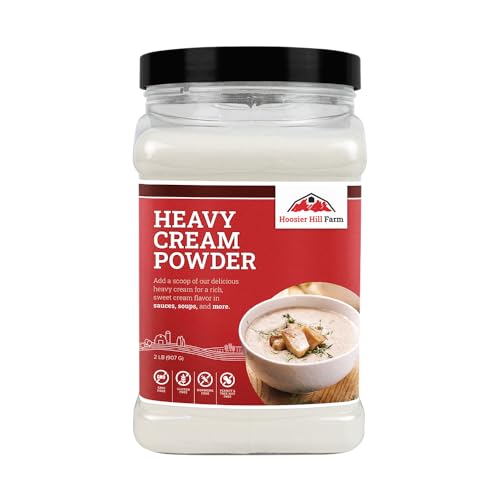Ever wondered if organic coffee is truly worth the extra cost? As you sip your morning brew, you might be questioning whether those organic certification labels make any real difference in taste, health, or environmental impact.
When comparing organic coffee vs. non-organic varieties, the distinctions go far beyond just the price tag. Organic coffee is grown without synthetic pesticides or fertilizers, often using sustainable farming methods that protect both the environment and coffee farmers. Meanwhile, conventional coffee production typically involves various chemicals that might leave residues in your cup and impact ecosystems where coffee is grown. These fundamental differences affect everything from flavor profiles to your personal health considerations.
What Is Organic Coffee?
Organic coffee is grown without synthetic pesticides, herbicides, or fertilizers, adhering to strict agricultural standards that promote ecological balance. These beans are cultivated using methods that emphasize sustainability and environmental stewardship throughout the entire production process.
Certification Standards and Requirements
Organic coffee certification involves rigorous third-party verification processes from organizations like the USDA, EU Organic, or Rainforest Alliance. To receive certification, coffee farms must maintain detailed records of all farming practices for at least 3 years before earning organic status. The land must be free from prohibited substances for 36 months, and farmers must carry out buffer zones to prevent cross-contamination from neighboring conventional farms. These certifications guarantee that coffee meets exact standards about soil quality, pest management, and biodiversity conservation. Regular inspections ensure ongoing compliance, with annual audits verifying that farmers continue to meet all organic requirements.
Growing Practices for Organic Coffee
Organic coffee farmers use natural cultivation methods that support healthy ecosystems and produce exceptional beans. Shade-growing techniques protect coffee plants under a canopy of diverse trees, creating habitats for birds and insects that naturally control pests. Farmers maintain soil fertility through composting, cover cropping, and applying natural amendments like coffee pulp, worm castings, and mineral-rich rock dust. Pest management relies on biological controls such as beneficial insects, companion planting, and manual removal rather than chemical answers. Water conservation plays a critical role in organic farming, with many producers implementing systems to reduce water usage during processing and prevent contamination of local water sources. These practices result in coffee that’s not only better for the environment but often develops more complex flavor profiles due to slower maturation in rich, living soils.
Understanding Non-Organic Coffee Production

Non-organic coffee production employs conventional farming methods that prioritize yield and efficiency over environmental sustainability. These practices have become standard in many coffee-growing regions worldwide, though they come with important tradeoffs compared to organic alternatives.
Conventional Farming Methods
Conventional coffee farming relies heavily on synthetic chemicals for both fertilization and pest management. Farmers apply chemical fertilizers designed to boost crop yields quickly, providing plants with concentrated nutrients that produce faster results than organic methods. Coffee plants grown conventionally are typically hybrid varieties specifically developed to thrive in full sun exposure rather than their natural shade environment. This sun-grown approach allows for denser planting arrangements and more straightforward harvesting operations, maximizing land use efficiency. The lack of shade cover, but, eliminates the natural network that traditionally surrounds coffee plants, reducing biodiversity and creating monoculture environments that require more chemical intervention.
Common Chemicals Used in Coffee Cultivation
The chemical arsenal employed in non-organic coffee production includes several categories of synthetic substances. Nitrogen-based fertilizers provide immediate nutrient boosts but can degrade soil quality over extended periods by disrupting natural microbial communities. Pesticides such as organophosphates and neonicotinoids target coffee-exact pests like the coffee borer beetle but may harm beneficial insects and pollinators in the process. Herbicides containing glyphosate and other active ingredients control unwanted vegetation between coffee rows but can contaminate local water sources through runoff. Fungicides protect plants from diseases like coffee rust but leave residues that may persist in the final product. These agricultural chemicals often contribute to environmental degradation beyond the immediate farm boundaries, affecting surrounding ecosystems through air drift and water contamination. For coffee workers, regular exposure to these substances presents health risks ranging from skin irritation to more serious long-term conditions without proper protective equipment.
Key Differences Between Organic and Non-Organic Coffee

Organic coffee cultivation follows strict natural farming practices without synthetic chemicals, while non-organic coffee relies on artificial substances for production. The USDA organic certification ensures coffee meets rigorous standards throughout the entire supply chain.
Environmental Impact Comparison
Organic coffee farming creates important environmental benefits by eliminating synthetic chemicals from the growing process. Farmers maintain biodiversity by integrating shade trees and natural foliage, which provides habitat for wildlife and beneficial insects that serve as natural pest controllers. This network approach improves soil quality over time through natural decomposition processes. Water resources near organic farms remain cleaner since there’s no chemical runoff contaminating local streams and rivers.
Conventional coffee production, by contrast, often creates harmful environmental consequences through chemical use. Pesticides and synthetic fertilizers applied to non-organic coffee plants frequently wash away during rainfall, polluting nearby water bodies and disrupting aquatic ecosystems. The practice of full-sun cultivation for higher yields results in deforestation and reduces habitat diversity, contributing to soil erosion and degradation in coffee-growing regions.
Health Considerations
Organic coffee contains fewer chemical residues that might impact your health over time. Without exposure to synthetic pesticides and herbicides during cultivation, organic beans deliver coffee’s natural compounds without potentially harmful contaminants. Research indicates that choosing organic coffee reduces your exposure to agricultural chemicals that may accumulate in conventional coffee.
Both organic and non-organic varieties provide similar inherent health benefits from coffee’s natural antioxidants and bioactive compounds. The primary health distinction comes from what’s not in organic coffee—chemical residues from conventional farming practices. Regular coffee drinkers particularly benefit from this reduction in chemical exposure due to their consistent consumption patterns.
The absence of synthetic chemicals in organic coffee doesn’t just benefit consumers but extends to the coffee farmers who avoid direct contact with potentially harmful substances during cultivation and harvesting. Farm workers on organic plantations experience fewer chemical-related health issues compared to those working with conventional methods.
Taste Profile Comparison

Organic coffee delivers a notably different taste experience compared to its non-organic counterpart. The flavor distinctions stem from cultivation methods, soil health, and absence of chemical residues that influence the final cup quality.
Does Organic Coffee Actually Taste Better?
Organic coffee typically offers a more complex and well-balanced flavor profile than conventional coffee. When you sip organic coffee, you’ll notice richer, more intense flavors with distinctive fruity undertones and a smoother, creamier mouthfeel. Coffee experts confirm that organic beans produce a cleaner, purer cup due to the absence of synthetic pesticides and chemical fertilizers that often leave residues causing bitterness or excessive acidity. These natural growing conditions preserve the coffee’s natural antioxidants and nutrients, improving the overall taste experience. Non-organic coffee, by comparison, frequently presents as more bitter, sharper, and less nuanced, with a thinner flavor profile that lacks the depth found in organic varieties.
Factors Affecting Flavor Beyond Certification
Several key elements influence coffee flavor regardless of organic certification:
- Growing Methods: Organic farms use natural fertilizers and pest management techniques such as composting and integrated pest control. These practices maintain essential soil microbial life that develops the complex flavor compounds in coffee beans.
- Soil Health: Nutrient-rich soil directly enhances the coffee plant’s ability to absorb essential minerals and compounds. This nutrient absorption translates to increased flavor intensity and quality in the cup.
- Environmental Conditions: Shade-grown cultivation, common in organic farming, supports greater biodiversity and creates ideal growing conditions for coffee plants. This ecological balance contributes significantly to bean development and flavor complexity.
- Processing Techniques: How coffee cherries are processed after harvesting impacts the final flavor. Organic producers often employ traditional methods that preserve the bean’s natural characteristics.
- Altitude and Climate: Coffee grown at higher elevations generally develops more complex flavor profiles due to slower maturation, regardless of organic status.
- Personal Taste Preferences: Even though the general consensus favoring organic coffee’s flavor, individual preferences vary widely. Your appreciation of certain flavor notes depends on your palate and brewing methods.
The natural, chemical-free farming practices of organic coffee cultivation promote healthier soil ecosystems and eventually produce beans with more intricate flavor profiles. While non-organic coffee may offer consistency and accessibility, it frequently lacks the depth and nuanced taste experience that organic coffee provides.
Price Considerations and Value

The price difference between organic and non-organic coffee reflects important variations in production methods and farming practices. Understanding these differences helps you make an well-informed choice about whether the premium price aligns with your values and preferences.
Why Organic Coffee Costs More
Organic coffee typically costs 20-40% more than conventional coffee due to several key factors. Labor-intensive farming practices require more hands-on care, including natural pest management and chemical-free soil maintenance, driving up production costs. Farmers must invest in rigorous organic certification processes, which involve substantial fees and ongoing compliance expenses.
Organic farms generally produce lower yields compared to conventional operations since they avoid synthetic fertilizers that boost production. Sustainable practices like shade-grown cultivation protect ecosystems but require more resources and management. Coffee plants in organic systems often take longer to mature, resulting in fewer harvests but potentially higher-quality beans.
These cost factors create a notable price difference at retail, with organic coffee commanding a premium that exceeds the typical 10-21% markup seen across general organic groceries. The complex farming requirements of organic coffee cultivation place it at the higher end of this premium range.
Is the Premium Price Worth It?
The additional cost of organic coffee provides value beyond the cup through tangible environmental benefits. Organic farming eliminates harmful chemicals, promoting biodiversity through shade tree cultivation, protecting water sources, and reducing the carbon footprint associated with conventional monoculture systems.
Some research suggests organic coffee contains higher levels of antioxidants and nutrients compared to conventional alternatives. Though these nutritional differences may be modest, they represent potential health advantages for regular coffee drinkers concerned about chemical residues in their daily brew.
Choosing organic coffee supports ethical and sustainable farming practices that protect ecosystems for future generations. Many coffee enthusiasts find this alignment with their environmental values justifies the price premium, even without considering other benefits.
About taste, opinions vary on whether organic coffee offers superior flavor. While some coffee drinkers report noticing distinct differences, factors such as bean origin, processing methods, and roasting techniques often influence flavor profiles more significantly than organic certification alone.
The value proposition of organic coffee extends beyond simple price comparison, encompassing ecological responsibility, potential health benefits, and support for sustainable agricultural systems that protect both people and the planet.
Making the Right Choice for Your Lifestyle

Choosing between organic and conventional coffee comes down to aligning your purchase with your personal values and priorities. Your coffee selection reflects not just taste preferences, but also your stance on health, environmental sustainability, and ethical considerations.
When to Choose Organic Coffee
Organic coffee offers important health benefits due to its cultivation without synthetic chemicals. You’re consuming a product with fewer chemical residues and potentially more natural antioxidants thanks to healthier soil practices. Many coffee drinkers report feeling better physically after switching to organic varieties, particularly those with chemical sensitivities.
The environmental impact of your coffee choice can’t be overstated. Organic farming maintains biodiversity by avoiding toxic agrochemicals that contaminate water sources and deplete soil nutrients. Your purchase supports network preservation, carbon sequestration, and sustainable agricultural practices that protect natural habitats for future generations.
Taste differences between organic and conventional coffee are notable to many enthusiasts. Organic coffee typically delivers cleaner, more nuanced flavors with distinctive character due to naturally enriched soils and balanced growing conditions. Coffee connoisseurs often describe organic varieties as having more complex flavor profiles with subtle fruit and floral notes that aren’t masked by chemical residues.
The ethical dimension of organic coffee extends beyond environmental concerns. Many organic coffees carry Fair Trade certification, ensuring farmers receive fair compensation for their labor-intensive work. Your purchase directly supports better living standards, improved working conditions, and community development in coffee-growing regions around the industry.
When Conventional Coffee Makes Sense
Conventional coffee presents practical advantages for many consumers even though its environmental drawbacks. You’ll find conventional options more readily available at most supermarkets, convenience stores, and cafes, making it the convenient choice when access to specialty stores is limited.
Budget constraints make conventional coffee appealing as it typically costs 20-40% less than organic alternatives. Your daily coffee habit becomes more economically sustainable when choosing conventional beans, especially if you’re consuming multiple cups daily or brewing for a household of coffee drinkers.
Flavor consistency attracts many conventional coffee drinkers. You’re getting a stronger, more uniform taste profile across batches, which appeals if you prefer bold, straightforward coffee flavors without subtle variations. Many conventional coffee brands have perfected consistent flavor profiles that satisfy consumers looking for reliability in their morning cup.
Research indicates that both organic and conventional coffees provide many of the same general health benefits associated with coffee consumption. Your conventional coffee still contains beneficial antioxidants and compounds linked to reduced risks of certain diseases, even though it may contain some chemical residues not present in organic varieties.
Conclusion
When deciding between organic and non-organic coffee you’re weighing several important factors. Organic coffee offers a cleaner product with fewer chemical residues while supporting sustainable farming practices that protect both the environment and workers’ health. Its complex flavor profile often delivers a more nuanced coffee experience.
Non-organic coffee provides accessibility and consistency at a lower price point which may better suit your budget and lifestyle needs. Both options contain coffee’s natural health benefits though organic eliminates potential chemical exposure.
Your choice eventually reflects your personal values. If environmental sustainability and potentially richer flavors are priorities organic coffee presents a compelling option even though the higher cost. If affordability and convenience matter most conventional coffee remains a practical choice for your daily cup.
Frequently Asked Questions
What is organic coffee?
Organic coffee is grown without synthetic pesticides or fertilizers under strict agricultural standards that promote ecological balance. To be certified organic, farms must undergo rigorous third-party verification from organizations like the USDA or Rainforest Alliance, maintain detailed records, and ensure their land has been free from prohibited substances for a specified period.
How does organic coffee farming differ from conventional methods?
Organic coffee farming uses natural methods like shade-growing, composting, and biological pest management to support healthy ecosystems. Conventional farming relies on synthetic chemicals, prioritizes yield over sustainability, and often creates monoculture environments. These differences impact environmental health, worker safety, and the final taste of the coffee.
Does organic coffee taste better than non-organic coffee?
Organic coffee typically offers a more complex, well-balanced flavor profile with distinctive fruity undertones. The absence of synthetic chemicals allows for cleaner, purer, and more intense flavors. While non-organic coffee often presents as more bitter and less nuanced, taste ultimately depends on factors like growing conditions, processing techniques, and personal preferences.
Why is organic coffee more expensive?
Organic coffee costs 20-40% more due to labor-intensive farming practices, lower yields, and certification expenses. The premium price reflects environmental benefits, sustainable farming methods, and fair compensation for farmers. Additionally, organic certification requires ongoing compliance with strict standards, which adds to production costs throughout the supply chain.
Is organic coffee healthier than conventional coffee?
Organic coffee contains fewer chemical residues, reducing potential health risks for regular drinkers and farm workers. While both varieties offer coffee’s natural antioxidants and health benefits, organic coffee eliminates exposure to potentially harmful pesticides and fertilizers. Some research suggests organic coffee may contain higher levels of antioxidants, though more studies are needed.
What environmental benefits does organic coffee provide?
Organic coffee farming maintains biodiversity, protects soil health, and preserves water quality by eliminating synthetic chemicals. These sustainable practices prevent habitat destruction, reduce pollution, and support ecological balance. Shade-grown organic coffee particularly benefits wildlife by preserving forest canopies that provide habitats for birds and other species.
How can I identify certified organic coffee?
Look for official certification labels from organizations like USDA Organic, Rainforest Alliance, or European Organic certification. These labels guarantee the coffee meets strict organic standards. Read packaging carefully, as terms like “natural” or “eco-friendly” without certification may be marketing tactics rather than verified organic products.
Is the organic certification process rigorous?
Yes, organic certification is extremely rigorous. Farmers must document their practices, undergo regular inspections, maintain chemical-free land for 2-3 years before certification, and implement comprehensive farm management plans. Third-party certifiers verify compliance with strict standards for soil management, pest control, and processing methods to ensure integrity.



















